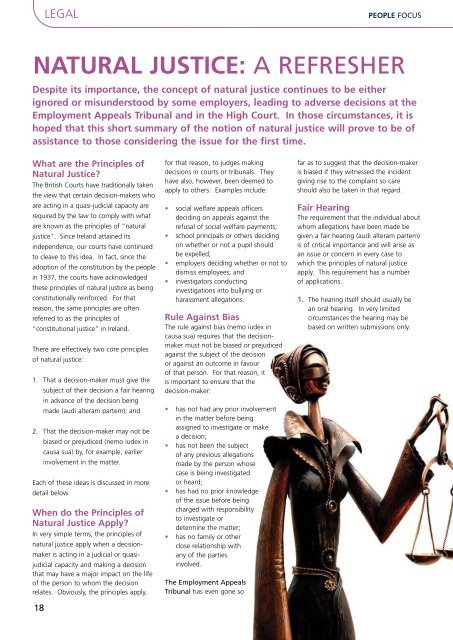PEOPLE FOCUS - CIPD
PEOPLE FOCUS - CIPD
PEOPLE FOCUS - CIPD
You also want an ePaper? Increase the reach of your titles
YUMPU automatically turns print PDFs into web optimized ePapers that Google loves.
LEGAL<br />
<strong>PEOPLE</strong> <strong>FOCUS</strong><br />
NATURAL JUSTICE: A REFRESHER<br />
Despite its importance, the concept of natural justice continues to be either<br />
ignored or misunderstood by some employers, leading to adverse decisions at the<br />
Employment Appeals Tribunal and in the High Court. In those circumstances, it is<br />
hoped that this short summary of the notion of natural justice will prove to be of<br />
assistance to those considering the issue for the first time.<br />
What are the Principles of<br />
Natural Justice?<br />
The British Courts have traditionally taken<br />
the view that certain decision-makers who<br />
are acting in a quasi-judicial capacity are<br />
required by the law to comply with what<br />
are known as the principles of “natural<br />
justice”. Since Ireland attained its<br />
independence, our courts have continued<br />
to cleave to this idea. In fact, since the<br />
adoption of the constitution by the people<br />
in 1937, the courts have acknowledged<br />
these principles of natural justice as being<br />
constitutionally reinforced. For that<br />
reason, the same principles are often<br />
referred to as the principles of<br />
“constitutional justice” in Ireland.<br />
There are effectively two core principles<br />
of natural justice:<br />
1. That a decision-maker must give the<br />
subject of their decision a fair hearing<br />
in advance of the decision being<br />
made (audi alteram partem); and<br />
2. That the decision-maker may not be<br />
biased or prejudiced (nemo iudex in<br />
causa sua) by, for example, earlier<br />
involvement in the matter.<br />
Each of these ideas is discussed in more<br />
detail below.<br />
When do the Principles of<br />
Natural Justice Apply?<br />
In very simple terms, the principles of<br />
natural justice apply when a decisionmaker<br />
is acting in a judicial or quasijudicial<br />
capacity and making a decision<br />
that may have a major impact on the life<br />
of the person to whom the decision<br />
relates. Obviously, the principles apply,<br />
18<br />
for that reason, to judges making<br />
decisions in courts or tribunals. They<br />
have also, however, been deemed to<br />
apply to others. Examples include:<br />
• social welfare appeals officers<br />
deciding on appeals against the<br />
refusal of social welfare payments;<br />
• school principals or others deciding<br />
on whether or not a pupil should<br />
be expelled;<br />
• employers deciding whether or not to<br />
dismiss employees; and<br />
• investigators conducting<br />
investigations into bullying or<br />
harassment allegations.<br />
Rule Against Bias<br />
The rule against bias (nemo iudex in<br />
causa sua) requires that the decisionmaker<br />
must not be biased or prejudiced<br />
against the subject of the decision<br />
or against an outcome in favour<br />
of that person. For that reason, it<br />
is important to ensure that the<br />
decision-maker:<br />
• has not had any prior involvement<br />
in the matter before being<br />
assigned to investigate or make<br />
a decision;<br />
• has not been the subject<br />
of any previous allegations<br />
made by the person whose<br />
case is being investigated<br />
or heard;<br />
• has had no prior knowledge<br />
of the issue before being<br />
charged with responsibility<br />
to investigate or<br />
determine the matter;<br />
• has no family or other<br />
close relationship with<br />
any of the parties<br />
involved.<br />
The Employment Appeals<br />
Tribunal has even gone so<br />
far as to suggest that the decision-maker<br />
is biased if they witnessed the incident<br />
giving rise to the complaint so care<br />
should also be taken in that regard.<br />
Fair Hearing<br />
The requirement that the individual about<br />
whom allegations have been made be<br />
given a fair hearing (audi alteram partem)<br />
is of critical importance and will arise as<br />
an issue or concern in every case to<br />
which the principles of natural justice<br />
apply. This requirement has a number<br />
of applications:<br />
1. The hearing itself should usually be<br />
an oral hearing. In very limited<br />
circumstances the hearing may be<br />
based on written submissions only.

















